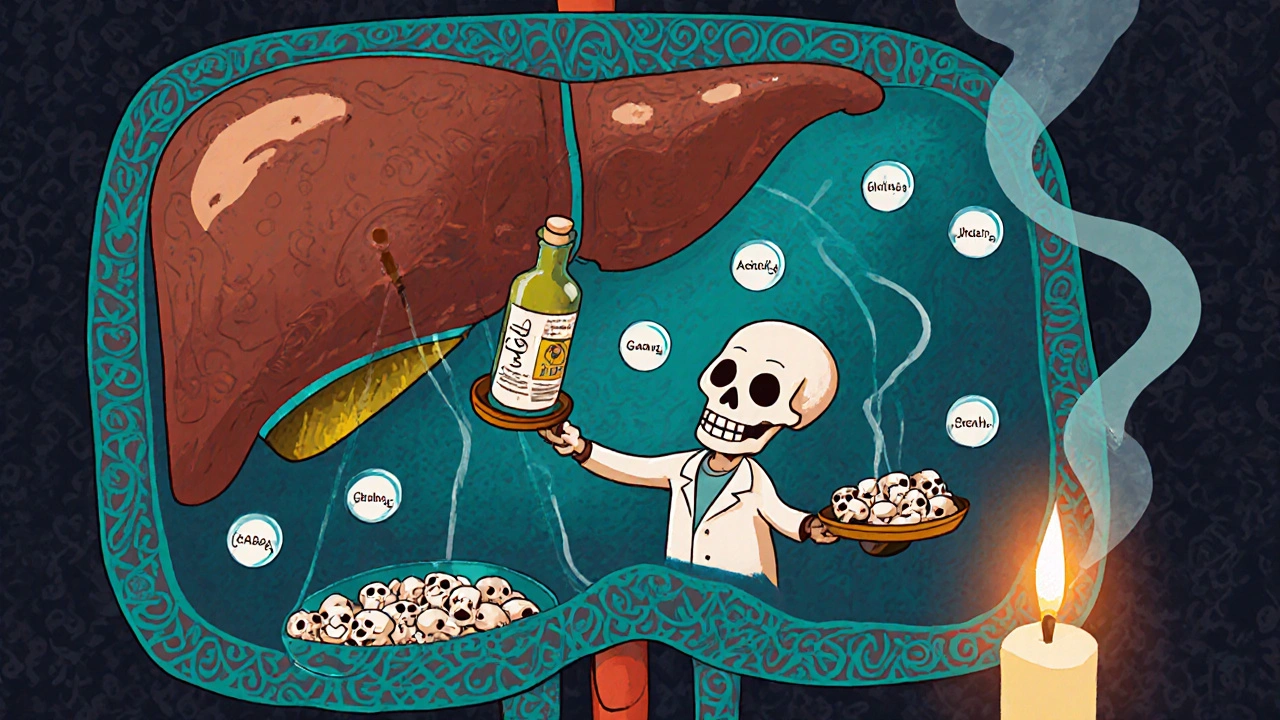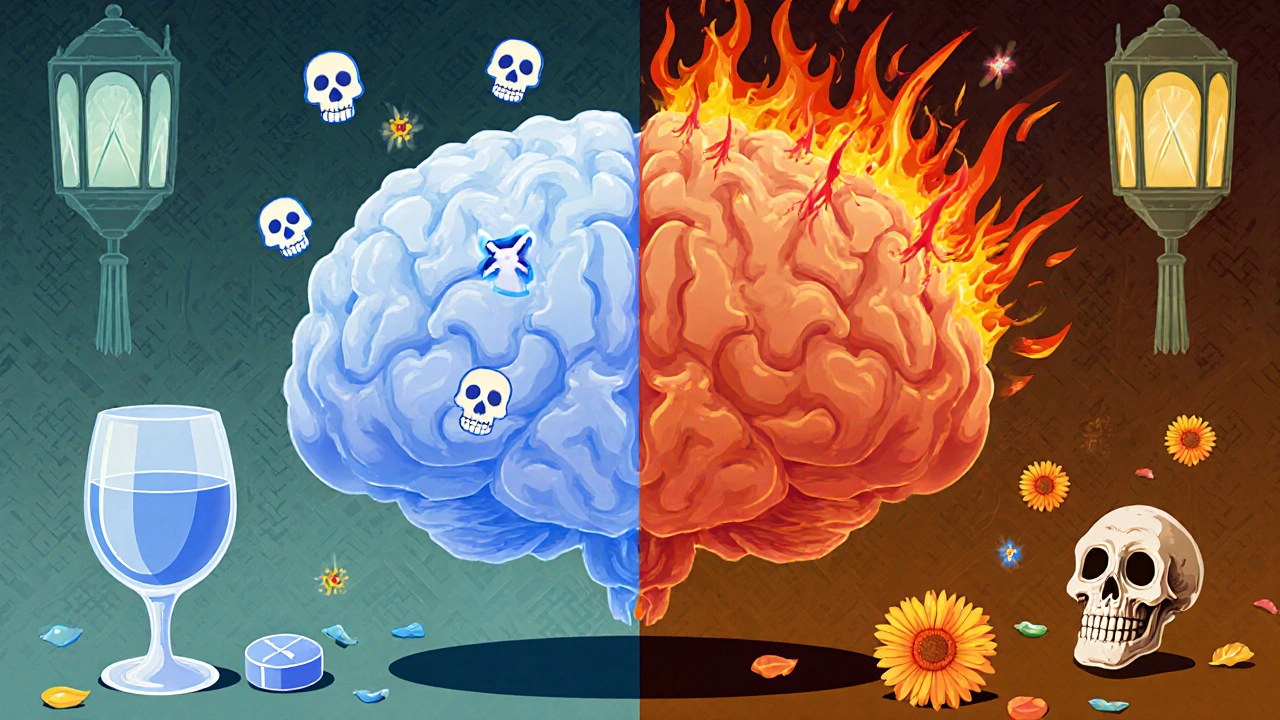Epilepsy & Alcohol Risk Calculator
Calculate Your BAC
Seizure Risk Level
| BAC (%) | Typical Effects | Seizure Risk |
|---|---|---|
| 0.00 - 0.02 | Little to no impairment | Low |
| 0.02 - 0.05 | Mild relaxation, slight coordination loss | Moderate |
| 0.05 - 0.08 | Reduced inhibition, noticeable slurred speech | High |
| 0.08+ | Marked motor impairment, blackouts possible | Very High |
Your estimated BAC
Key guidelines for people with epilepsy:
Stay below 0.02% BAC for lowest seizure risk
Avoid binge drinking
Always monitor AED levels if drinking regularly
When we talk about Epilepsy a chronic neurological disorder that causes recurrent seizures, one of the most common questions is how Alcohol a psychoactive beverage containing ethanol influences seizure risk. Understanding the connection helps patients, families, and clinicians make informed choices about drinking, medication, and everyday life.
How Alcohol Affects the Brain
A Seizure a sudden, uncontrolled electrical disturbance in the brain is the end result of an imbalance between excitatory and inhibitory signals. Alcohol initially boosts the activity of GABA gamma‑aminobutyric acid, the brain’s primary inhibitory neurotransmitter, which can temporarily raise the seizure threshold and make a brief episode less likely.
However, this calming effect is short‑lived. As the body metabolizes ethanol, the inhibitory boost fades while the excitatory neurotransmitters - mainly glutamate - rebound, creating a "rebound hyperexcitability" that can provoke seizures, especially in people with a pre‑existing seizure disorder.
The liver plays a starring role in this process. Liver metabolism the enzymatic breakdown of alcohol primarily by alcohol dehydrogenase converts ethanol to acetaldehyde, then to acetate, clearing the substance from the bloodstream. The speed of this conversion determines a person’s Blood Alcohol Concentration the percentage of ethanol present in the blood (BAC) at any given moment, a key metric for seizure risk.
Why People with Epilepsy Are Particularly Sensitive
People with epilepsy already have a lowered seizure threshold due to structural, genetic, or metabolic factors. Adding alcohol to the mix can push the threshold over the edge in several ways:
- Fluctuating BAC levels: Rapid rises and falls in BAC create alternating periods of inhibition and excitation, making the brain’s electrical environment unstable.
- Interaction with Antiepileptic drugs medications used to prevent seizures, often referred to as AEDs can either reduce drug effectiveness or increase side‑effects.
- Alcohol can worsen sleep disruption, a known seizure trigger, and increase stress hormones like cortisol, which further destabilize neuronal networks.
Even low to moderate drinking may be enough to provoke a seizure if the person’s baseline control is fragile. The risk is not linear; a small amount of alcohol can cause a big impact for some, while others may tolerate a drink without immediate trouble.
Alcohol and Antiepileptic Drug Interactions
Most AEDs are metabolized in the liver. When alcohol is present, it competes for the same enzymes, leading to two possible scenarios:
- Reduced drug levels: Alcohol can speed up the clearance of certain AEDs (e.g., carbamazepine, phenytoin), lowering their protective effect.
- Increased toxicity: For drugs with a narrow therapeutic window (e.g., valproate, phenobarbital), alcohol can raise plasma concentrations, causing dizziness, drowsiness, or even worsening seizures.
Patients should always discuss their drinking habits with a neurologist. Blood tests can confirm whether AED levels remain in the therapeutic range after alcohol consumption.

Safe Drinking Guidelines for People with Epilepsy
There is no one‑size‑fits‑all answer, but the following checklist helps translate research into everyday practice:
- Know your baseline: Keep a seizure diary and note any correlation with alcohol intake.
- Limit BAC: Stay below 0.02% (roughly one standard drink for most adults) to minimize rebound excitation.
- Avoid binge drinking: Consuming multiple drinks in a short period spikes BAC and then crashes sharply.
- Never mix with sedatives: Combining alcohol with benzodiazepines or sleep aids dramatically raises seizure risk.
- Stay hydrated and eat: Food slows alcohol absorption, leading to a steadier BAC curve.
- Monitor medication: Schedule regular blood tests for AED levels if you drink regularly.
- Plan for emergencies: Have a trusted friend or family member aware of your condition in case a seizure occurs after drinking.
Following these steps doesn’t guarantee safety, but it reduces the odds of a surprise seizure and keeps you in control of your health.
What Happens During Alcohol Withdrawal?
Stopping alcohol abruptly after heavy or chronic use can trigger a withdrawal syndrome. One of the most serious complications is the "alcohol withdrawal seizure," which typically occurs 6‑48 hours after the last drink.
These seizures are not caused by the underlying epilepsy but by the sudden removal of alcohol’s inhibitory effect on the brain. For someone already diagnosed with epilepsy, the two mechanisms can overlap, resulting in a higher frequency of seizures during the withdrawal window.
Medical detoxification, often with benzodiazepines or other anticonvulsants, is the safest way to manage withdrawal. If you suspect a problem, seek professional help immediately.

Managing Long‑Term Risks
Beyond the immediate effects of a single drinking episode, chronic alcohol use can lead to structural brain changes, such as hippocampal atrophy, that worsen seizure control over time. It can also impair liver function, reducing the organ’s ability to process both alcohol and AEDs.
Regular check‑ups with your neurologist, liver function tests, and honest conversations about lifestyle are essential. If you notice increased seizure frequency, mood swings, or cognitive fog, it may be time to reassess your relationship with alcohol.
For many, the safest route is complete abstinence, especially if seizures are poorly controlled or if you’re on multiple AEDs. However, some individuals can maintain good seizure control with modest, occasional drinking - always under medical supervision.
Quick Checklist for Safer Choices
- Track every drink in a journal.
- Keep BAC below 0.02%.
- Avoid mixing alcohol with other depressants.
- Stay hydrated and eat before drinking.
- Schedule regular AED blood level tests.
- Seek professional help if you notice withdrawal symptoms.
- Discuss any drinking plans with your neurologist.
| BAC (%) | Typical Effects | Seizure Risk Level |
|---|---|---|
| 0.00‑0.02 | Little to no impairment | Low (but not zero for sensitive patients) |
| 0.02‑0.05 | Mild relaxation, slight coordination loss | Moderate - rebound excitation begins as alcohol clears |
| 0.05‑0.08 | Reduced inhibition, noticeable slurred speech | High - significant fluctuation in neuronal excitability |
| 0.08+ | Marked motor impairment, blackouts possible | Very High - severe imbalance, strong trigger for seizures |
Frequently Asked Questions
Can people with epilepsy drink alcohol safely?
Safety depends on individual seizure control, medication regime, and drinking pattern. Small amounts (one drink, BAC < 0.02%) may be tolerated, but any drinking should be discussed with a neurologist and monitored closely.
Does alcohol make AEDs less effective?
Yes. Alcohol can speed up the metabolism of certain AEDs, lowering their blood levels, or it can increase toxicity for drugs with a narrow therapeutic window. Blood tests are the best way to know.
What are the signs of an alcohol‑related seizure?
Typical signs include a sudden loss of consciousness, rhythmic jerking of limbs, confusion after the event, and a possible “post‑ictal” fatigue. If a seizure follows drinking, it’s a red flag to cut back or stop.
How long after a drink can a seizure still occur?
Seizure risk can linger for several hours as BAC falls, especially during the rapid decline phase. Most experts advise monitoring for at least 6‑8 hours after the last drink.
Is it okay to use over‑the‑counter sleep aids with alcohol?
No. Combining any sedative-OTC antihistamines, melatonin, or prescription sleep meds-with alcohol dramatically raises the likelihood of a seizure.
By staying informed about how epilepsy and alcohol interact, you can make choices that protect your brain, keep your medication effective, and reduce the chance of an unexpected seizure. When in doubt, reach out to your healthcare team-personalized advice beats generic rules every time.


Bobby Marie
October 19, 2025 AT 19:06If you think a single sip is harmless, think again; even a tiny buzz can tip the seizure balance.
Jameson The Owl
October 23, 2025 AT 04:42The interplay between ethanol metabolism and antiepileptic drug clearance is not a coincidence it is engineered by a hidden pharmaceutical agenda that profits from patient dependency on costly medication regimes.
Sunil Yathakula
October 26, 2025 AT 13:18Hey, i totally get how scary it feels when a drink seems harmless and then a seizure hits you later.
We all need a solid routine and maybe keep a diary, even if it feels like extra work.
Remember you are not alone many folks are fighting the same battle and there are support groups online.
sravya rudraraju
October 29, 2025 AT 22:54Understanding the neurochemical cascade triggered by ethanol is essential for anyone managing epilepsy; the initial potentiation of GABAergic inhibition may give a false sense of security, yet the subsequent glutamatergic rebound creates a volatile environment for neuronal firing.
Clinical observations have demonstrated that even modest fluctuations in blood alcohol concentration can destabilize the delicate equilibrium maintained by antiepileptic drugs, particularly those with narrow therapeutic windows such as valproate.
Patients are therefore advised to maintain meticulous records of alcohol intake alongside seizure diaries to identify personal thresholds and patterns.
Moreover, it is critical to consider the pharmacokinetic interactions; ethanol competes for hepatic enzymes, potentially accelerating the metabolism of carbamazepine and phenytoin, thereby reducing their plasma concentrations and efficacy.
Conversely, alcohol can inhibit the clearance of drugs like phenobarbital, raising serum levels to toxic ranges and precipitating sedation or additional seizure activity.
Healthcare providers should schedule periodic serum level testing, especially for individuals who consume alcohol regularly, to ensure therapeutic dosing is maintained.
From a lifestyle perspective, strategies such as consuming food before drinking, staying well hydrated, and limiting intake to a single standard drink can moderate the rate of absorption and attenuate peak BAC spikes.
Avoiding binge drinking is paramount, as rapid surges and subsequent crashes in BAC are the most potent triggers for post‑drink seizures.
Additionally, co‑administration of other central nervous system depressants, including benzodiazepines or over‑the‑counter sleep aids, should be strictly avoided due to synergistic depressant effects that dramatically increase seizure risk.
For those experiencing withdrawal after chronic alcohol use, medical detoxification under professional supervision is recommended to prevent withdrawal seizures, which can compound existing epileptic conditions.
Long‑term excessive alcohol consumption has been associated with structural brain changes, such as hippocampal atrophy, which can further impair seizure control and cognitive function.
Regular monitoring of liver function tests is advised, as hepatic impairment not only affects drug metabolism but also contributes to systemic inflammation that may lower seizure thresholds.
In summary, while modest, controlled alcohol consumption may be tolerated by some individuals with well‑controlled epilepsy, the safest approach for many remains abstinence, particularly for those with refractory seizures or polypharmacy.
Ultimately, personalized medical guidance, vigilant self‑monitoring, and open communication with neurologists are the cornerstones of reducing alcohol‑related seizure risk.
Ben Bathgate
November 2, 2025 AT 08:30Honestly the article sounds like a watered‑down warning pamphlet; if you’re already struggling with seizures you should just ditch the booze altogether instead of trying to “moderate” it.
Ankitpgujjar Poswal
November 5, 2025 AT 18:06Listen up – you can train your body and mind to handle stress, but never let alcohol become your excuse for a slip‑up; stay disciplined, hydrate, and keep your meds on schedule.
Catherine Viola
November 9, 2025 AT 03:42It is academically evident that the correlation between ethanol intake and seizure exacerbation is not merely anecdotal but is substantiated by peer‑reviewed studies that reveal a statistically significant increase in ictal events post‑consumption.
Thokchom Imosana
November 12, 2025 AT 13:18One must contemplate the broader implications of the alcohol‑epilepsy nexus beyond the superficial clinical guidelines, for the omnipresent influence of sociopolitical forces subtly dictates the narratives presented to patients.
The pharmaceutical lobby, vested in perpetuating medication dependence, subtly downplays lifestyle modifications such as abstinence, thereby ensuring a continuous market for antiepileptic drugs.
Consequently, the educational material often emphasizes “moderate drinking” while omitting the nuanced data that illustrate profound variability in individual susceptibility.
This reductionist approach not only undermines patient autonomy but also reflects a systemic bias towards profit over preventative health.
Thus, a discerning reader must interrogate the source of these recommendations, cross‑reference independent research, and consider adopting a more conservative stance regarding alcohol consumption.
DHARMENDER BHATHAVAR
November 15, 2025 AT 22:54Maintain a strict drinking limit and keep your seizure diary updated; consistency is key.
Kevin Sheehan
November 19, 2025 AT 08:30From a philosophical standpoint, the dilemma of enjoyment versus health risk invites us to weigh immediate pleasure against long‑term well‑being, recognizing that the brain's delicate equilibrium deserves respect.
Rakhi Kasana
November 22, 2025 AT 18:06The drama of a midnight seizure after a “harmless” cocktail is a stark reminder that temptation can lead to tragedy; let us not romanticize the momentary buzz when the stakes are life‑altering.